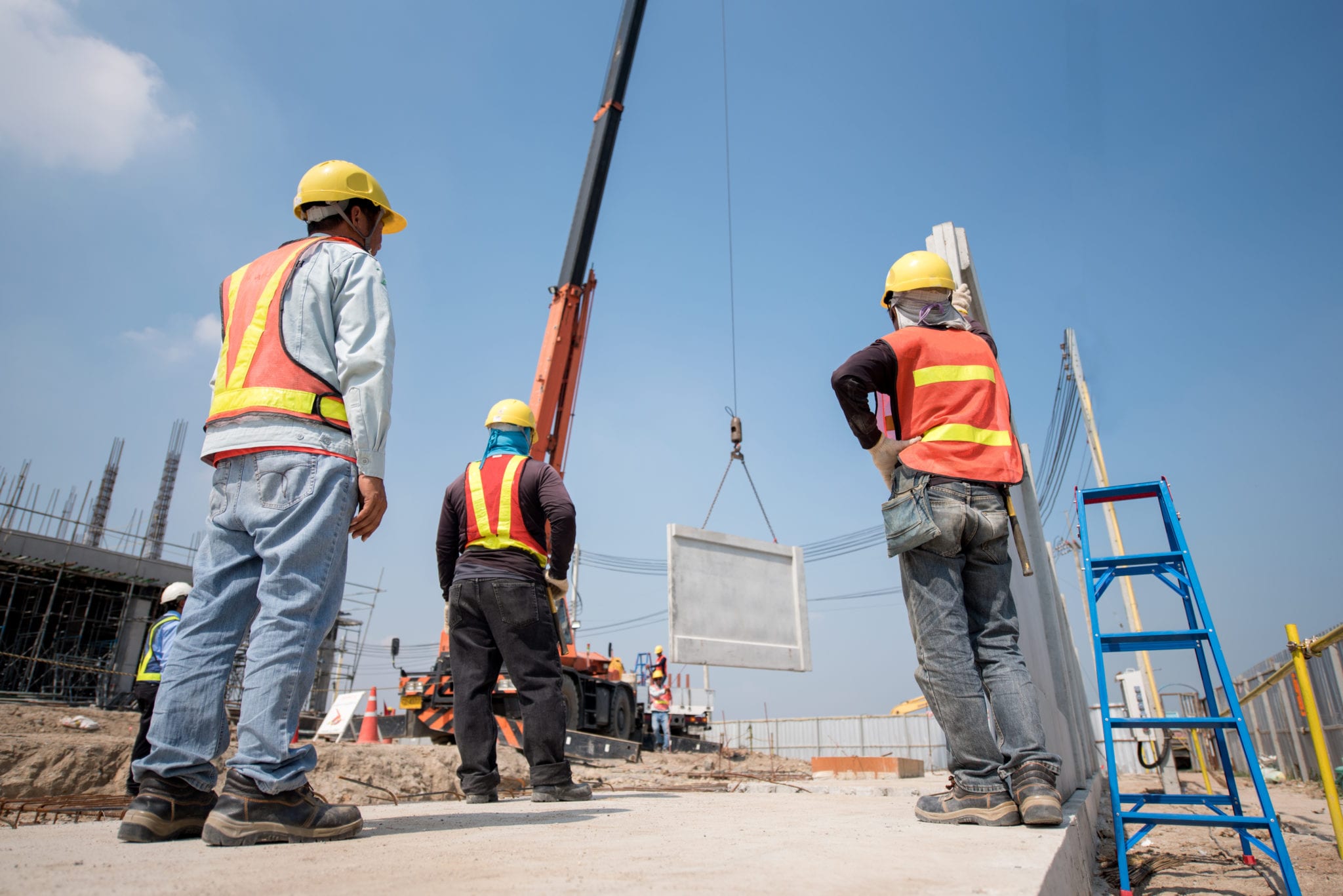Home>diy>Building & Construction>How Does Bidding Work In Construction


Building & Construction
How Does Bidding Work In Construction
Modified: December 7, 2023
Learn how bidding works in the construction industry and get insights into the process of building construction. Discover the key factors and strategies involved in successful bidding.
(Many of the links in this article redirect to a specific reviewed product. Your purchase of these products through affiliate links helps to generate commission for Storables.com, at no extra cost. Learn more)
Introduction
When it comes to construction projects, bidding plays a crucial role in determining which contractor will secure the project. The bidding process allows construction companies to compete for projects by submitting proposals that outline their pricing, expertise, and capabilities.
Understanding how bidding works in construction is essential for contractors who want to win projects and for project owners seeking the best contractor for their needs. In this article, we will delve into the intricacies of the bidding process, from preparing the bid to finally awarding the contract.
So, let’s dive into the world of construction bidding and explore the steps involved in this competitive process.
Key Takeaways:
- The construction bidding process involves thorough preparation, accurate cost estimation, and compelling bid proposals to showcase a contractor’s expertise and secure successful project outcomes.
- Project owners benefit from a systematic evaluation process to select the best contractor based on cost competitiveness, qualifications, experience, and project approach, ensuring successful project delivery.
Read more: What Is Bid Bond In Construction
Understanding the Bidding Process
The bidding process in construction is a systematic and competitive method that allows project owners to select a contractor to complete their construction project. It typically involves several steps, including preparing the bid, identifying project requirements, obtaining cost estimates, developing the bid proposal, submitting the bid, evaluating the bids, and finally awarding the contract.
At its core, the bidding process aims to ensure transparency, fairness, and efficiency in selecting the most qualified contractor at the best price. It gives contractors an opportunity to showcase their expertise, experience, and ability to deliver the project within the specified requirements and budget.
The process starts with the project owner issuing a request for proposals (RFP) or invitation to bid (ITB), which outlines the project details, scope, and requirements. Contractors who are interested in bidding on the project review the RFP/ITB and decide whether or not to participate.
Once a contractor decides to bid, the next step is to gather all the necessary information and resources to prepare a comprehensive bid proposal. This involves understanding the project requirements, creating a project plan, estimating costs, and determining the resources needed (such as labor, materials, and equipment).
The bidding process requires contractors to carefully analyze the project scope and specifications, ensuring that they fully understand the client’s needs. This includes reviewing the architectural and engineering plans, attending pre-bid meetings, and asking clarifying questions if necessary.
Based on the gathered information, contractors can then develop a detailed bid proposal that includes a breakdown of costs, a timeline for completion, and any additional qualifications or value-added services they can offer. It is crucial for the bid proposal to provide accurate and competitive pricing while demonstrating the contractor’s expertise in delivering the project successfully.
Once the bid proposal is complete, it is submitted to the project owner by the specified deadline. The submission process may involve mailing or hand-delivering the proposal or using an online bidding platform, depending on the requirements set by the project owner.
After the bid submission deadline, the project owner evaluates the received bids to determine which contractor best meets their criteria. Factors considered during the evaluation process may include price, qualifications, experience, previous work history, and overall value offered by the contractor.
Once the evaluation process is complete, the project owner awards the contract to the selected contractor. This is typically done through a formal contract agreement that outlines the terms, conditions, and scope of the project.
Understanding the bidding process is crucial for both contractors and project owners. It allows contractors to effectively compete for projects and showcase their capabilities, while project owners can evaluate and select the best contractor for their specific needs.
In the following sections, we will delve into each step of the bidding process in more detail to provide a comprehensive overview of how it works and what to consider at each stage.
Preparing the Bid
Preparing the bid is a critical step in the construction bidding process. It requires careful planning, analysis, and attention to detail to ensure that the bid proposal accurately reflects the contractor’s capabilities and offers a competitive solution. Here’s a breakdown of the key considerations when preparing a bid:
1. Review the bid documents: The bid documents provided by the project owner contain essential information such as project scope, specifications, contract terms, and evaluation criteria. It is crucial to thoroughly review these documents to understand the project requirements and address them comprehensively in the bid proposal. Pay close attention to any special instructions or specific qualifications required by the project owner.
2. Visit the project site: Before finalizing the bid, it is beneficial to visit the project site to gain firsthand knowledge of the site conditions, access points, and any potential challenges that may impact the construction process. This site visit will help in accurately estimating project costs and formulating a realistic project plan.
3. Estimate the costs: Developing an accurate cost estimate is a crucial aspect of preparing the bid. This involves estimating the costs of materials, labor, equipment, permits, subcontractors, overheads, and contingencies. It is essential to use reliable cost databases, historical data, and industry benchmarks to ensure the estimate is competitive and realistic.
4. Assess the resources: Evaluating the resources required for the project is essential to ensure that the bid proposal aligns with the contractor’s capacity. This includes assessing the availability of skilled labor, equipment, and subcontractors who can handle the project effectively and within the given timeline.
5. Develop the bid strategy: Based on the project requirements, competitors, and available resources, contractors need to develop a strategic approach for their bid. This includes identifying the unique selling points, value-added services, or technical expertise that can give the bid an edge over the competition.
6. Formulate the project plan: A well-structured project plan is crucial for presenting a comprehensive bid proposal. It outlines the phasing, scheduling, and sequencing of work activities, as well as the milestones, deliverables, and timelines. A clear and detailed project plan demonstrates the contractor’s ability to manage the project effectively and deliver it on time.
7. Determine the pricing: Pricing is a critical component of the bid proposal. Contractors need to carefully consider the cost estimate, market conditions, profit margins, and any unique project requirements when determining their pricing strategy. It is important to strike a balance between offering competitive pricing and maintaining profitability.
8. Prepare the bid documentation: The bid documentation includes all the necessary forms, attachments, and supporting documents required by the project owner. This may include a signed bid form, qualifications, references, insurance certificates, and any other requested information. It is important to ensure that all the required documentation is complete, accurate, and submitted on time.
By paying attention to these key considerations, contractors can prepare a strong and competitive bid that accurately reflects their capabilities, offers a realistic pricing proposal, and stands out among the competition. Thoughtful preparation is key to success in the bidding process and increasing the chances of winning construction projects.
Identifying Project Requirements
Identifying project requirements is a crucial step in the construction bidding process. It involves thoroughly analyzing the project documents and specifications to understand the client’s needs and deliver a bid proposal that meets those requirements. Here are the key aspects to consider when identifying project requirements:
1. Review the project documentation: The project documentation, including the Request for Proposals (RFP) or Invitation to Bid (ITB), provides valuable insights into the project requirements. Carefully review the documents to understand the scope of work, project goals, timelines, and any specific technical or functional requirements that need to be addressed in the bid proposal.
2. Analyze architectural and engineering plans: Architectural and engineering plans provide detailed information about the design, layout, and structural requirements of the project. Review these plans to gain a thorough understanding of the construction process and identify any challenges or special considerations that need to be accounted for in the bid proposal.
3. Clarify any ambiguities: If there are any ambiguities or uncertainties in the project documentation, seek clarification from the project owner. It is essential to have a clear understanding of the requirements to ensure that the bid proposal accurately addresses and meets the needs of the client.
4. Assess site conditions: Visit the project site and assess the existing site conditions. This will help in understanding the terrain, accessibility, and any potential obstacles that may affect the construction process. By considering site conditions in the bid proposal, contractors can demonstrate their ability to handle the project efficiently and mitigate any site-related challenges.
5. Understand regulatory and compliance requirements: Construction projects are subject to various regulatory and compliance requirements. Familiarize yourself with the relevant regulations, building codes, permits, and environmental considerations that need to be addressed in the bid proposal. Ensuring compliance with these requirements will give the bid a competitive advantage and demonstrate the contractor’s commitment to quality and adherence to regulations.
6. Identify material and equipment specifications: Analyze the project specifications to identify the required materials, equipment, and systems specified by the client. This includes determining the quality standards, sizes, quantities, and any specific brand preferences. Aligning the bid proposal with the client’s material and equipment specifications helps in providing an accurate cost estimate and showcasing the contractor’s ability to meet the project requirements.
7. Consider any sustainability or energy-efficiency requirements: In recent years, there has been an increasing focus on sustainability and energy efficiency in construction projects. If the project owner has specified any sustainability goals or energy-efficiency requirements, ensure that the bid proposal addresses these aspects. Demonstrating a commitment to sustainable practices can give the bid a competitive advantage and align with the client’s values.
8. Evaluate any project-specific considerations: Each construction project may have unique considerations and requirements that need to be identified and addressed. This could include a specific construction methodology, subcontractor qualifications, project phasing, or coordination with other ongoing projects. Understanding and incorporating these project-specific considerations in the bid proposal showcases the contractor’s attentiveness and ability to tailor their approach to meet the client’s needs.
By diligently analyzing the project requirements, contractors can develop a bid proposal that aligns with the client’s vision, meets the specified requirements, and demonstrates their ability to deliver a successful construction project. Attention to detail and a comprehensive understanding of the project requirements is key to a competitive and winning bid.
Obtaining Cost Estimates
Obtaining accurate cost estimates is a crucial step in the construction bidding process. It involves evaluating the various components and factors that contribute to the overall cost of a construction project. Here are the key considerations when obtaining cost estimates:
1. Material Costs: Materials constitute a significant portion of construction project costs. Research suppliers and obtain quotes to determine the cost of materials required, such as concrete, steel, lumber, electrical components, plumbing fixtures, and finishing materials. Consider factors like quality, quantity, delivery fees, and any special material requirements specified in the project documentation.
2. Labor Costs: Labor costs include wages, benefits, insurance, and other expenses associated with the workforce. Evaluate the number of laborers required for the project and estimate the hours needed for completion. Consider the skills and expertise required for specific tasks and any labor market fluctuations that may affect wage rates.
3. Equipment Costs: Construction projects often require various types of equipment, ranging from heavy machinery to specialized tools. Determine the equipment needed, their rental or purchase costs, fuel consumption, maintenance, and operator expenses. Consider the duration of equipment usage and any logistical challenges that may impact costs.
4. Subcontractor Costs: Some aspects of the project may require specialized subcontractors, such as electricians, plumbers, HVAC technicians, or concrete specialists. Contact subcontractors to obtain quotes and factor in their costs, including labor, materials, equipment, and any overhead and profit margins they may include. Ensure that the subcontractors are qualified and reliable.
5. Overhead Costs: Overhead costs include indirect expenses not directly attributable to a specific task or resource. These may include general administration expenses, insurance, permits, licenses, utilities, and project management costs. Evaluate your overhead expenses and allocate a portion to each project based on factors such as project complexity, duration, and resource requirements.
6. Contingency Costs: It is essential to include a contingency factor in the cost estimate to account for unexpected events, changes, or risks that may arise during the project. Typically, a percentage of the total project cost is allocated as contingency to cover unforeseen expenses or address issues that may impact the construction process. The contingency amount may vary depending on project complexity, site conditions, and risk assessments.
7. Historical Data and Industry Benchmarks: Utilize historical project data and industry benchmarks to ensure the accuracy and competitiveness of your cost estimate. Assess cost data from similar completed projects, considering factors like location, size, complexity, and materials used. Industry associations and construction cost databases can provide valuable benchmarks for various construction tasks and materials.
8. Review and Refine: Regularly review and refine your cost estimate as you gather more information and analyze the project requirements in depth. Consider feedback from suppliers, subcontractors, and industry experts. Ensure that your estimate accounts for all significant costs and factors, leaving no room for underestimation or surprises during the construction process.
Obtaining accurate cost estimates is crucial for developing a competitive and realistic bid proposal. A thorough evaluation of material costs, labor expenses, equipment needs, subcontractor quotes, overhead and contingency costs, as well as leveraging historical data and industry benchmarks, will help ensure that your bid proposal reflects the true cost of the project and positions you for success in the bidding process.
When bidding on a construction project, make sure to thoroughly review the project specifications and requirements before submitting your bid. This will help ensure that your bid is accurate and competitive.
Read more: How To Bid On Construction Projects
Developing the Bid Proposal
The bid proposal is a crucial component of the construction bidding process as it showcases the contractor’s capabilities, expertise, and approach to successfully completing the project. Developing a compelling and comprehensive bid proposal requires careful consideration of various factors. Here are the key steps to follow when developing the bid proposal:
1. Introduction: Start the bid proposal with an introduction that provides an overview of your company, highlighting your experience, qualifications, and key projects completed. This section should establish trust and credibility with the project owner.
2. Understanding of Project Requirements: Clearly demonstrate your understanding of the project requirements outlined in the project documentation. Specify how your proposed solution aligns with the client’s needs and project goals. Highlight any unique challenges or considerations you have identified and explain how you will address them.
3. Project Approach and Methodology: Describe your project approach and methodology. Explain how you will execute the project, including the sequencing of tasks, scheduling, and coordination with subcontractors or other stakeholders. Emphasize your ability to deliver the project on time and within budget.
4. Team and Key Personnel: Introduce your project team and key personnel who will be involved in the project. Include their qualifications, relevant experience, and expertise. This will instill confidence in the project owner that your team has the necessary skills and knowledge to successfully complete the project.
5. Project Plan: Develop a detailed project plan that outlines the phasing of work, milestones, and timelines. Provide a clear breakdown of each construction stage and the tasks involved. Incorporate any scheduling constraints or critical deadlines specified by the project owner. This will illustrate your well-structured approach to project management.
6. Cost Breakdown: Present a comprehensive and transparent cost breakdown in your bid proposal. Break down costs by major components, such as materials, labor, equipment, and subcontractors. Clearly explain how you arrived at these costs, allowing the project owner to understand and validate the pricing of your bid.
7. Value-Added Services and Differentiators: Highlight any value-added services or differentiators that set your bid apart from competitors. This could include innovative construction methods, sustainability initiatives, quality control measures, or technology integration. Showcasing these unique aspects will demonstrate the added value you bring to the project.
8. References and Past Performance: Provide references and examples of past projects similar in scope or complexity to the current bid. Include testimonials or references from clients who can vouch for your quality of work, adherence to timelines, and overall satisfaction. This will reinforce your credibility and track record in delivering successful projects.
9. Compliance and Safety: Emphasize your commitment to safety and regulatory compliance. Outline your safety protocols, certifications, and any industry-specific standards you adhere to. Address any environmental or sustainability considerations that are relevant to the project.
10. Executive Summary: Conclude the bid proposal with an executive summary that provides a concise overview of your proposal. Summarize the key strengths, benefits, and advantages of your bid. This section should leave a positive and lasting impression on the project owner.
Developing a compelling bid proposal requires a careful balance of technical expertise, project understanding, and persuasive writing skills. Remember to tailor your proposal to the specific needs of the project owner and showcase your unique capabilities that make you the best choice for the project. A well-crafted bid proposal can significantly increase your chances of securing the construction contract.
Submitting the Bid
Submitting the bid is the culmination of the construction bidding process. It is the final step where contractors formally present their bid proposal to the project owner for evaluation. Here are the key considerations when submitting the bid:
1. Review Submission Requirements: Carefully review the bid submission requirements outlined in the project documentation. Note the deadline, preferred format (physical or electronic), and any specific instructions or forms that must be included.
2. Complete all Required Documentation: Ensure that you have completed and compiled all the necessary bid documentation and forms. This may include the bid form, signed contract documents, qualifications, references, insurance certificates, and any other supporting materials requested by the project owner.
3. Double-Check for Accuracy: Before submitting the bid, thoroughly review all the information and calculations to ensure accuracy. Mistakes in pricing or missing information can negatively impact your bid evaluation. It is crucial to double-check all bid components to avoid any potential errors.
4. Meet the Submission Deadline: Submit your bid proposal on or before the specified deadline. Late submissions are typically disqualified, so make sure to allocate enough time to assemble and deliver the bid. If it’s an electronic submission, ensure that your files are properly uploaded and that you have received confirmation of successful submission.
5. Present a Professional Image: Present your bid proposal in a professional and organized manner. If submitting a physical bid, use a well-designed bid package with clear dividers, labels, and a professional cover letter. If submitting electronically, make sure your digital files are well-organized and presented in a clear and logical format.
6. Maintain Confidentiality: Respect the confidentiality of the bid process. Avoid discussing or sharing sensitive bid details with external parties to prevent potential bias or unfair advantage. Adhere to any confidentiality agreements or requirements specified by the project owner.
7. Properly Follow-Up: After submitting the bid, consider following up with the project owner to confirm receipt and to address any questions or concerns they may have. This demonstrates your commitment and professionalism throughout the bidding process.
8. Stay Positive and Patient: Once the bid is submitted, it is important to maintain a positive and patient mindset. Understand that the evaluation process takes time, and the project owner may need additional time to review and compare all the bids received. Avoid pressuring or constantly contacting the project owner for updates.
Submitting the bid is a critical step that requires attention to detail, organization, and timely delivery. By following proper procedures and presenting your bid professionally, you increase your chances of a favorable evaluation and potential selection for the construction project.
Evaluating the Bids
Evaluating the bids is a crucial stage in the construction bidding process as it allows the project owner to assess and compare the proposals submitted by contractors. The evaluation process aims to identify the most qualified contractor who can meet the project requirements effectively. Here are the key considerations when evaluating the bids:
1. Establish Evaluation Criteria: Define clear evaluation criteria based on project-specific requirements and priorities. Common criteria may include price, qualifications, experience, past performance, schedule, and proposed project approach. Assign appropriate weights or scores to each criterion to facilitate the decision-making process.
2. Review Bid Documentation: Thoroughly review each bid documentation to ensure that all required forms and supporting documents are provided. Verify that the bids are complete and compliant with the project owner’s requirements. Disqualify any bids that fail to meet the submission criteria.
3. Analyze Cost Competitiveness: Analyze the pricing component of each bid to evaluate cost competitiveness. Compare the bid prices against the estimated project budget and consider any deviations or outliers. Assess the breakdown of costs and ensure all necessary items are included to avoid potential cost overruns or omissions.
4. Assess Qualifications and Experience: Evaluate the qualifications and experience of each contractor. Consider factors such as the size and complexity of past projects, their track record of on-time completion, financial stability, technical expertise, and relevant certifications. Ensure that the contractors have the necessary licenses and insurances required for the project.
5. Consider Project Approach and Methodology: Assess the project approach and methodology proposed by each contractor. Evaluate the feasibility, comprehensiveness, and alignment with project goals and requirements. Look for innovative solutions, value engineering proposals, or unique approaches that demonstrate a deep understanding of the project scope and challenges.
6. Evaluate Past Performance: Consider references, testimonials, or past performance records provided by the contractors. Contact relevant references to gather feedback on the quality of work, communication, collaboration, and overall satisfaction with their past projects. Assess how well the contractors mitigate risks, resolve issues, and deliver on their commitments.
7. Review Schedule and Timeframe: Evaluate the proposed project schedule and timeframe. Assess if the contractor has provided a realistic and achievable timeline for completing the project. Consider any potential scheduling conflicts, resource availability, or phasing plans proposed by the contractors.
8. Conduct Interviews or Presentations: Depending on the complexity and size of the project, consider conducting interviews or presentations with shortlisted contractors to gain a deeper understanding of their capabilities, project approach, and problem-solving skills. This can help in assessing their communication, teamwork, and ability to address project-specific concerns.
9. Consider Value-Added Services or Innovations: Evaluate any value-added services or innovations proposed by the contractors. Assess the potential benefits, cost savings, or added value these services can bring to the project. Consider sustainability initiatives, energy-efficiency proposals, or technology integration that align with the project owner’s objectives.
10. Make an Informed Decision: Based on the evaluation of the bids using the established criteria, make an informed decision on the contractor to award the project to. Consider all relevant factors, weigh the strengths and weaknesses of each bid, and select the contractor and bid that best aligns with the project owner’s needs, priorities, and budget.
By following a systematic and objective evaluation process, project owners can ensure a fair and thorough assessment of the bids received. This allows them to choose a contractor who not only meets the project requirements but also brings the necessary expertise, value, and reliability to successfully complete the construction project.
Awarding the Contract
Awarding the contract is the final step in the construction bidding process, where the project owner selects the contractor to undertake the project. It is a critical decision that requires careful consideration of several factors. Here is an overview of the key considerations when awarding the contract:
1. Compliance and Conformance: Ensure that the selected contractor has met all the necessary requirements set forth in the bidding process. This includes verifying their compliance with bid submission guidelines, document completeness, and adherence to any mandatory project requirements.
2. Evaluation Matrix: Refer to the previously established evaluation criteria to guide the decision-making process. Use the predetermined weights or scores assigned to each criterion to objectively compare and evaluate the bids. Take into account all aspects, including cost, qualifications, experience, project approach, past performance, and any other relevant factors.
3. Value for Money: Consider the value for money offered by each bid. Assess the balance between the proposed cost and the quality of work expected. While it may be tempting to automatically choose the lowest bid, it is essential to carefully evaluate the overall value and quality provided by the selected contractor.
4. Contractor Capability: Evaluate the selected contractor’s capability to successfully carry out the project. Consider their experience, expertise, available resources, and track record in similar projects. Assess their ability to deliver the project on time, within budget, and in compliance with all project requirements.
5. References and Recommendations: Take into account any positive references or recommendations provided by clients or industry professionals. Consider their satisfaction levels, any commendations received, and their experiences working with the contractors being considered for the project. Reliable references can provide valuable insights into the contractor’s reliability and professionalism.
6. Negotiation: If necessary, enter into negotiations with the selected contractor to finalize contract terms and conditions. This may involve discussing cost adjustments, project timeline, scope of work, or any contractual requirements. Open and transparent communication during this stage is crucial to ensure mutual understanding and agreement.
7. Contract Documentation: Draft a detailed contract agreement that clearly outlines the scope of work, project schedule, milestones, payment terms, and any other contractual obligations. Ensure that the contract incorporates all the agreed-upon terms and complies with legal and industry standards. Seek legal advice if needed to ensure the contract adequately protects the interests of all parties involved.
8. Formal Award Announcement: Once the contract is finalized and signed by both parties, make a formal announcement to communicate the award of the contract to the selected contractor. Notify the unsuccessful bidders and provide feedback, if requested, to maintain transparency and fairness in the process.
9. Build a Strong Working Relationship: Establish a positive and collaborative working relationship with the awarded contractor. Foster open communication, encourage regular project updates, and address any concerns or issues promptly. A strong working relationship sets the foundation for successful project execution.
10. Contract Management: Throughout the project, actively manage the contract to ensure compliance with all agreed-upon terms and conditions. Monitor the contractor’s progress, resolve any disputes or conflicts, and conduct regular performance reviews to maintain project alignment and mitigate potential risks.
Awarding the contract is a crucial decision that involves assessing all relevant factors, including competency, value, and capability. By following a transparent and objective evaluation process and establishing clear contract agreements, project owners can choose a contractor that best aligns with their requirements and sets the stage for successful project execution.
Read more: How To Bid For Construction Jobs
Conclusion
The construction bidding process is a complex and competitive endeavor that plays a pivotal role in determining which contractor will be awarded a construction project. By understanding and effectively navigating this process, both contractors and project owners can achieve successful outcomes.
For contractors, the bidding process provides an opportunity to showcase their expertise, qualifications, and capabilities. By thoroughly understanding the project requirements, obtaining accurate cost estimates, and developing a compelling bid proposal, contractors can position themselves as strong contenders in the highly competitive construction industry.
On the other hand, project owners benefit from the bidding process as it allows them to evaluate and compare various proposals to select the contractor that best matches their project goals, requirements, and budget. By following a systematic evaluation process, considering factors such as cost competitiveness, qualifications, experience, project approach, and past performance, project owners can make informed decisions that lead to successful project outcomes.
Throughout the bidding process, clear communication, transparency, and a professional approach are essential for both contractors and project owners. Contractors should focus on presenting their bid proposals in a comprehensive and persuasive manner, while project owners need to ensure a fair, unbiased, and thorough evaluation of the bids received.
Successful bidding relies on meticulous attention to detail, thorough analysis of project requirements, accurate cost estimation, and the ability to effectively communicate value and expertise. It is a collaborative effort that requires creativity, industry knowledge, and a deep understanding of the construction process.
Ultimately, the construction bidding process is a vital step that enables the best contractor to be selected for a project, leading to successful project delivery, client satisfaction, and the accomplishment of project goals. By respecting the process, adhering to industry standards, and fostering a collaborative environment, both contractors and project owners can mutually benefit from this process.
As the construction industry continues to evolve, it is crucial for contractors and project owners to adapt and stay informed about industry trends, technological advancements, and sustainability practices. By continually improving their bidding strategies and processes, both parties can embrace innovation and deliver exceptional results in the dynamic world of construction.
Frequently Asked Questions about How Does Bidding Work In Construction
Was this page helpful?
At Storables.com, we guarantee accurate and reliable information. Our content, validated by Expert Board Contributors, is crafted following stringent Editorial Policies. We're committed to providing you with well-researched, expert-backed insights for all your informational needs.














0 thoughts on “How Does Bidding Work In Construction”